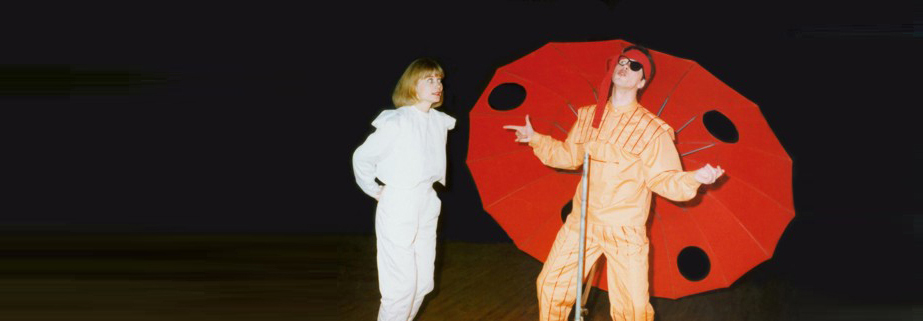The "ghetto theatre era" came to an end in 1990. Valdas Vasiliauskas, „Sudie Geto teatrui“, Literatūra ir menas, 1990-03-24, p. 6. Theatre lost the imperative of its main source of inspiration – conflict with the regime, simultaneously losing its special form of communication, the secret nature of its conspiracy with the public. As French theatre theoretician Georges Banu wrote in a study of the changes on the stages of Eastern and Central Europe inspired by events in 1989, the theatre "felt lonely, and that encouraged introspection and creative freedom". Georges Banu, „Laisvės patirtis“, Kultūros barai, 2001, Nr. 12, p. 59.
Naturally, attempts at reform and reorientation began – some elated, but others also often quite painful. The old state theatres began to stir: after Dalia Tamulevičiūtė stepped aside as director of the Youth Theatre in 1989, its new leader and former theatre critic Rūta Vanagaitė suspended the schedule of repertory plays for a few months in the autumn of 1990 and declared a "100 day moratorium." The head of the Academic Drama Theatre, Henrikas Vencevičius, retired in 1990. Replacing him was Jonas Vaitkus, who dismissed the greater portion of the theatre's older actors and replaced them with his former students. In 1994, however, he became a director without a theatre. In 1990, Jonas Jurašas joyfully returned from the United States to the Kaunas Drama Theatre full of reformist intentions, but by 1993 he was forced to give up. New artistic groups were avidly formed. Actor and director Benas Šarka started the avant-garde Gliukų Teatras in Klaipėda in 1988. The 1986 graduating class of actors of the State Conservatory united to form the "Keistuolių Teatras" (The Freaks Theatre) in 1989, while Rimas Tuminas and his band of creative talent began the new history of the Small Theatre in 1990. In 1993, Valentinas Masalskis founded a theatre studio in Kaunas that he called "Menas į šoną" (Art to the Side) (renamed the "Arts Collective" from 1995–1999), staging works that had been suppressed in the Soviet era, including plays by Peter Handke, Samuel Beckett and Eugène Ionesco. Eimuntas Nekrošius left the Youth Theatre in 1993 and found shelter under the auspices of LIFE, the Lithuanian international theatre festival, and established his own theatre studio "Meno Fortas" (Fortress of Art) in 1998. An intensive network of international ties developed. New trips abroad, tours and internships began. The LIFE Lithuanian international theatre festival debuted in Vilnius in 1993.
In this confusing time of the reforming of the "ghetto theatre" and the creation of "freedom's theatre", the domination of the influential trio of directors from the 1980s – Nekrošius, Vaitkus and Tuminas – continued.
On the other hand, however, their "one-party rule" was no longer as self-evident as it once was. Younger talent became ever more present in the most important stage events of the day. Cezaris Graužinis directed the play Badas (Hunger), based on a novel by Knut Hamsun, at the Youth Theatre in 1989. Graužinis later directed at several other theatres, and established a theatre company in 1996 called the Lithuanian New Generation Theatre Community. In 1989, Gintaras Varnas introduced himself in a unique way with the political satire of his "Šėpos teatras" (and after 1992 worked as a freelance director). During the "100 days moratorium", Oskaras Koršunovas – then a second-year theatre directing student (under the tutelage of Jonas Vaitkus) at the Lithuanian Music Academy – debuted powerfully in 1990 with his Ten būti čia (There To Be Here), based on stories by Daniil Kharms. Soon after, Koršunovas was universally recognized as the leader of the new generation of directing talent and went on to direct at the Academic Drama Theatre from 1990 to 1998, and subsequently founded a theatre under his own name in 1999.




Comments
Write a comment